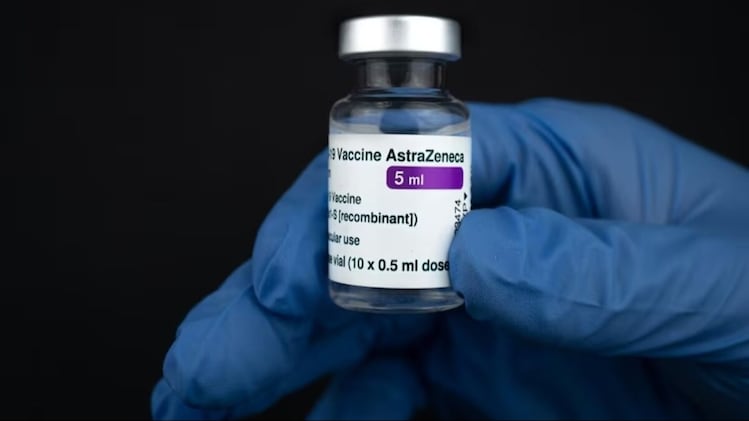
COVISHIELD OFF SHELVES FOR 2 YEARS IN INDIA, ASTRAZENECA WITHDRAWS GLOBALLY
Once the most sought-after vaccine against Coronavirus in India, Covishield has been missing from government institutions, private hospitals, and Covid-19 vaccination centers for the past two years due to no demand.
Its maker, AstraZeneca, has now announced the global withdrawal of the vaccine, marketed under brand names Covishield and Vaxzevria, developed in collaboration with the University of Oxford.
The decision comes amid reports of vaccine surplus and recent controversies regarding its side effects, with the pharmaceutical giant acknowledging adverse reactions in a UK court, as reported by The Telegraph.
No demand, no supply
In India, Covishield is manufactured by the Serum Institute of India (SII) under a licensing agreement with AstraZeneca. SII, one of the world's leading vaccine producers, ceased Covishield production in December 2021 due to low demand.
"With India achieving high vaccination rates in 2021 and 2022, coupled with the emergence of new mutant variant strains, the demand for previous vaccines diminished significantly. Consequently, since December 2021, we have stopped the manufacturing and supply of additional doses of Covishield,” said a SII spokesperson.
“We fully understand the ongoing concerns and it is crucial to emphasise our commitment to transparency and safety. From the outset, we have disclosed all rare to very rare side effects, including Thrombosis with Thrombocytopenia Syndrome, in the packaging insert in 2021,” the spokesperson added.
“Despite the challenges faced during the global pandemic, the safety of the vaccine remains paramount. Regardless of whether it's AstraZeneca's Vaxzervria or our own Covishield, both vaccines have been instrumental in saving millions of lives worldwide. We commend the collaborative efforts of governments and ministries in facilitating a unified global response to the pandemic.”
The India effect
The manufacturing pause mirrored a broader trend where Indian hospitals have also refrained from procuring the vaccine. "The Covid-19 immunisation programme has effectively ended in private hospitals. Initially, there was high demand, but with the slowdown of Covid-19 and the majority of the Indian population already vaccinated, hospitals have halted the procurement of Covid-19 vaccines from pharmaceutical companies. A large number of vaccine doses have expired long ago while being stored in hospitals," said Dr. Girdhar Gyani, Chief Executive Officer (CEO) of the Association of Healthcare Providers - AHPI (India), representing private hospitals in the country.
SII announced its partnership with AstraZeneca and Oxford University to manufacture the vaccine in April 2020. Adar Poonawalla, the CEO of SII, recently stated his company stopped Covishield production, mentioning a stock of a few hundred million doses, of which 100 million doses had already expired.
The Centre, under its national Covid-19 immunisation programme, has also not procured any Covid-19 vaccines from any domestic or international manufacturers since early 2022.
"Companies like AstraZeneca, not primarily focused on vaccine production, aided during the Covid-19 crisis despite vaccines not being their core business. It is not significant that they are withdrawing the vaccine," said vaccinology expert Dr. Naveen Thacker, a member of the Covid-19 expert task force of doctors formulated by the government and President of the International Pediatric Association.
AstraZeneca is facing a class-action lawsuit in the UK over allegations of vaccine-related fatalities and serious injuries. "Manufacturing of Covishield has already ceased, and discussions about other markets are no longer relevant. Furthermore, it is common for vaccines to have side effects, but in 2024, advancements in technology have led to the development of safer and more effective vaccines compared to those in 2020. With numerous vaccine candidates available, there is currently no demand or consumption for vaccines in India, signifying progress and advancement in the field," said Thakkar.
Government’s Covid-19 target achieved
Since January 16, 2021, India actively started administering Covid-19 vaccines. As of March 4, 2023, India has delivered over 2.2 billion doses, including first, second, and precautionary (booster) doses of approved vaccines. In terms of vaccination coverage, 95% of the eligible population aged 12 and above has received at least one shot, with 88% fully vaccinated.
Initially, India authorised Covishield alongside Covaxin developed by Bharat Biotech. Subsequently, Sputnik V, Moderna, Johnson & Johnson, ZyCoV-D developed by Zydus Cadila, and other vaccine candidates were also in local clinical trials.
Covishield, produced at SII's Pune facility with a master seed from Oxford University and AstraZeneca, had been a cornerstone of India's mass immunisation programme. Covishield, with its affordable price and easy storage requirements, was a favored choice for many developing nations, and India had exported over 66 million doses through its Vaccine Maitri initiative. Vaccine Maitri (Vaccine Friendship) is a humanitarian initiative undertaken by the Indian government to provide Covid-19 vaccines to countries around the world. With the pandemic transitioning to an endemic phase, the pace of vaccine exports under Vaccine Maitri might have slowed down in 2023.
According to data released by the Ministry of External Affairs under the Vaccine Maitri initiative, as of June 15, 2023, a total of 520.27 lakhs (5.2027 million) Covishield vaccines have been supplied globally. These vaccines have been sent to various countries as part of India's commitment to global vaccination efforts.
2024-05-08T11:40:46Z dg43tfdfdgfd